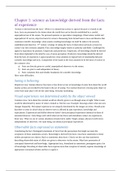Samenvatting
Summary What Is This Thing Called Science 4th edition, Leiden 2017/2018
- Instelling
- Universiteit Leiden (UL)
This is a summary of the book "What Is This Thing Called Science?", 4th edition, for the first year course Psychology and Science at Leiden University, 2017/2018. I summarized the chapters and the parts of the chapters we had to read. It's a pretty detailed summary, so it contains everything you ne...
[Meer zien]





